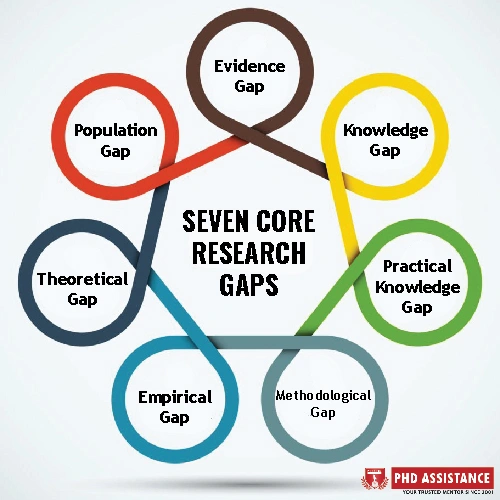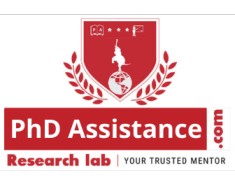Effective Ways of Conducting Research Gap Analysis and Its Impact over Future Research
The existence of research gaps appears to be in the open to interpretation. The gap of one scholar may be the non-gap of another. Many scholars will make the argument that a gap is either one idea or another. Most doctoral scholars, still find it difficult to identify and interpret gaps in their research. However, every research scientist aspires to be an innovator in a field by finding a new topic that no other researcher has addressed. This is an area of research that needs to be filled. Contact PhD Assistance for PhD Research Gap Analysis.
Research gaps are especially beneficial to the advancement of knowledge in broad sense. Finding a gap in research and possessing the resources to conduct a comprehensive and long-term study on it can be incredibly rewarding for the researcher, not to consider how its latest discoveries can benefit our entire civilization. Experts at PhD Assistance have decades of experience in Research Gap identification.
How to Find a Gap in Research
We at PhD Assistance offer best services for Gap analysis for PhD literature reviews. Because it is unthinkable to go through all of the survey and data currently findable, there are a few measures that can be taken to help detect research gaps:
- Choose a topic or issue that inspires you: Because research can require a significant amount of tangible, erudite, and psychological effort, select a topic that will keep you inspired all through the phase.
- Look for key phrases and similar things to your chosen topic.
- Conduct a literature search using the recognized keywords.
- Look for incomplete or unaddressed issues under discussion related to your main topic.
- Go over systematic reviews. They occasionally help identify areas or topics that require more interest from scholars and scientists.
You can trust us for PhD Dissertation Writing Help.
Seven Core Research Gaps
PhD Assistance is well- acclaimed in offering Best PhD Research Gap Analysis. Miles (2017) suggested a framework with seven core research gaps renamed: Evidence Gap; Knowledge Gap; Practical-Knowledge Gap; Methodological Gap; Empirical Gap; and Theoretical Gap; and Population Gap.
Evidence Gap: An evidence gap occurs when a new study finding appears to contradict commonly held beliefs. This gap is caused by inconsistencies in previous observations. It takes place when research findings enable for inferences in and of themselves, but are conflicting when viewed from a more conceptual perspective. We at PhD Assistance offer best services for PhD Research Process.
Knowledge Gap: For starters, awareness of theories and literature from related studies contexts may not exist in the real field. Second, it is possible that the findings of a survey vary from what was anticipated. Experts at PhD Assistance have decades of experience in Conducting Research Gap Analysis,
Practical-Knowledge Gap: This type of gap seems to be a variance that can inspire new study in this area. A practical–knowledge gap occurs when experts’ actual behavior differs from their endorsed behavior. In this particular instance, study could try to ascertain the context of the conflict as well as the explanations for its occurrence.
Methodological Gap: A methodological gap is one that deals with the conflict that arises as a result of the impact of research methods on study outcomes. This gap identifies the discord with prior research papers’ research techniques and proposes a new field of enquiry that is distinct from those methodologies. PhD Assistance experts has experience in handling to Publish the journal papers in all research subjects with assured 2:1 distinction. Talk to Experts Now
Empirical Gap: An empirical gap is one that engages with gaps in previous research. This disagreement is about the need for research results or proposals to be assessed or tested experientially. For example, the empirical gap frequently identifies conflict arising from the fact that no research has directly tried to assess a specific subject using an experimental method to date. PhD Assistance has vast experience in developing dissertation research topics for student’s pursuing the UK dissertation in computer science. Order Now
Theoretical Gap: A theoretical gap is one that engages with theoretical gaps in relation to previous research. A theoretical conflict may exist, for example, if one phenomenon is explained using variety of theoretical frameworks, similar to a Research Methodology Gap conflict. Scholars and researchers could investigate which of these hypotheses is better in terms of the gap in previous research. Theoretical gaps are prevalent when reviewing prior research on a concept. PhD Assistance is well- acclaimed in offering Future Research Help.
Population Gap: A population gap is a well-known gap among researchers. There are always underserved and under-researched communities. This gap represents the type of population studies that is not properly portrayed or under-researched in the scientific basis or scholarly findings. You can trust us for Future PhD Research Services.

Research Gap for Future Studies
The term “gaps in the literature” refers to missing or insufficient information in the research literature. These are aspects where more research is needed because they are undiscovered, inadequately researched, or obsolete. The gap is critical because its omission would result in a repetition of the research process. The groundwork of studies is built on making statements and discovering new areas of research predicated on gaps in past studies. This is a motivating factor in the pursuit of new knowledge. Contact PhD Assistance for Literature Gap and Future Research.
Reference
- Miles, D.A. (2017). A Taxonomy of Research Gaps: Identifying and Defining the Seven Research Gaps, Doctoral Student Workshop: Finding Research Gaps – Research Methods and Strategies, Dallas, Texas, 2017.
- Müller-Bloch, C. & Kranz, J., (2014). A Framework for Rigorously Identifying Research Gaps in Qualitative Literature Reviews, The Thirty Sixth International Conference on Information Systems, Fort Worth 2015, pp. 1–19.
- Miles, D. A. (2017, August). A taxonomy of research gaps: Identifying and defining the seven research gaps. In Doctoral Student Workshop: Finding Research Gaps-Research Methods and Strategies, Dallas, Texas(pp. 1-15).



